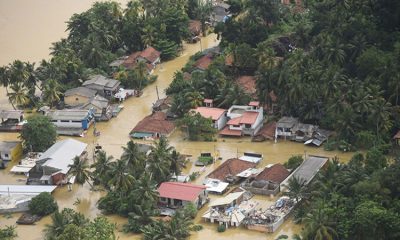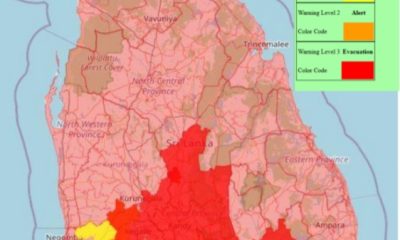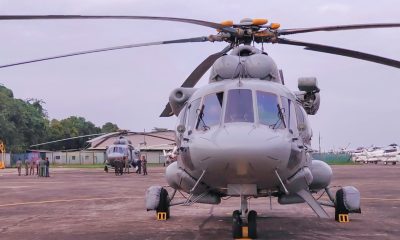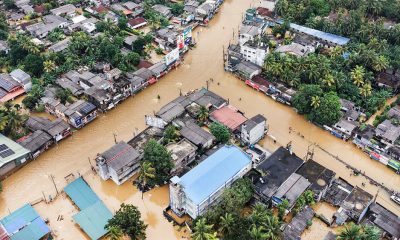Editorial
Cost of complacency

Monday 5th October, 2020
There has been hardly any difference between Sri Lanka and the US under President Donald Trump, during the last few months, anent the COVID-19 preventive measures; caution was thrown to the wind. A police curfew has now been imposed in the Minuwangoda and Divulapitiya areas to contain the spread of COVID-19 following the detection of an infection at the community level. More than 100 persons have been placed under quarantine and contact sourcing is going on, we are told. It is hoped that the spread of the disease will be curbed. Another wave of infections is the last thing the country needs while it is still reeling from the crippling impact of the first wave.
We argued in this space, on Saturday, that having lowered its guard, the country was asking for trouble. Trouble favours those who ask for it. The absence of coronavirus infections for a couple of weeks did not mean that the pandemic was over here. Sri Lankans did not realise this and behaved as if they had beaten the virus once and for all. In New Zealand, which left nothing to chance in combating COVID-19, the second wave of infections came after a lapse of about three months.
Unfortunately, Sri Lankans and their leaders do not seem to learn from others’ experience. It was said in jest in the run-up to the last general election here that New Zealand had postponed its parliamentary polls in view of a second wave of infections, and Sri Lanka had put off the COVID-19 second wave because of its general election.
All it takes to trigger an explosive community spread of COVID-19 is a single infection in a crowded place or a bus/train. Contact tracing is possible only in a situation where there are a limited number of patients. When infections increase exponentially, it becomes well-nigh impossible to control the situation, as has been the experience of the US, India, etc.
Coronavirus has bowled over even the economic giants such as the US and China. Sri Lanka should have left no room for complacency. Its credit rating has been further downgraded, and this has made the task of attracting the much-needed FDI and drawing international loans even more difficult. It is doubtful whether the Sri Lankan economy, which is already in tatters, will survive another round of lockdowns and a breakdown in national production. The government was blissfully oblivious to the danger and did not heed warnings. If only it had remained alert.
If the government had cared to make the public adhere to the health guidelines indefinitely and ordered the police and the public health officials to enforce them strictly, the need for imposing a curfew, albeit in a couple of areas, would not have arisen. Regrettably, the government’s focus shifted from the economic and health fronts to the political front thanks to its preoccupation with the 20th Amendment to the Constitution. Power has a blinding effect on the wielders thereof and makes them take leave of their senses.
Ironically, President Gotabaya Rajapaksa almost got on top of the pandemic situation with the help of the exiting powers in the executive presidency so much so that the SLPP scored an impressive win at the last general election. Now, the President’s party has a two-thirds majority in Parliament and an all-out attempt is being made to strengthen his position, but the virus has made a comeback and had an unsettling impact on the country again. The need for the government to stay maniacally focused on the health front for the next few months or until an anti-coronavirus vaccine is found cannot be overemphasised.
Meanwhile, the government had better go flat out to prevent panic buying, the signs of which are already visible due to the curfew in Divulapitiya and Minuwangoda. Unscrupulous traders are likely to make the most of the situation and fleece the public. The country was lucky in March, when lockdowns were imposed, because there were enough stocks of essentials which had been imported to meet the traditional New Year demand. Shortages could therefore be averted. It is doubtful whether there are enough stocks at present owing to the import restrictions aimed at shoring up the country’s depleted foreign reserves and mitigating its balance of payment woes. The government must get cracking lest shop shelves should be stripped bare within the next few days.
Editorial
Cyclone-hit budget

Saturday 6th December, 2025
The NPP government’s Budget 2026 was passed yesterday with a 157-vote majority. Its passage was a foregone conclusion, given the NPP’s supermajority in Parliament, but whether it can be implemented as previously planned is in doubt.
When Budget 2026 was presented on 07 November, it outlined revenue plans and expenditure allocations for 2026, based on the situation prevalent at the time, but Cyclone Ditwah has upended revenue and expenditure projections to the extent of making one doubt the viability of the budget. The Opposition called for Budget 2026 withdrawal and the presentation of a fresh one with the post-disaster economic realities factored in.
Commissioner General of Essential Services Prabath Chandrakeerthi has gone on record as saying the economic cost of the recent disasters could amount to about 6-7 billion US dollars or 3-5% of GDP. Thus, the workability of the budget hinges on the government’s ability to raise this huge amount of funds for reconstruction.
Restoring critical infrastructure is a prerequisite for maintaining economic growth momentum. The government is said to have curtailed capital expenditure to keep state expenditure low, but it will now have to change its strategy, and spend more on infrastructure. This is likely to shift the budget’s centre of gravity, so to speak.
Nothing is said to be more certain than the unexpected. The government was on cloud nine about a fortnight ago, boasting that the state coffers were overflowing under its watch. What it left unsaid was that taxes on vehicle imports had boosted state revenue exponentially. There was a sharp increase in vehicle imports, which had been suspended for several years in view of the country’s foreign currency woes; the current revenue bubble may burst when vehicle imports drop. When the government made the above-mentioned boastful claims, it may not have thought it would have to seek disaster assistance two weeks later. The uphill task the NPP has to accomplish is making its budget work vis-à-vis the post-disaster challenges.
The Opposition is right in having urged the government to take cognisance of the plight of disaster victims and make sufficient budgetary allocations for relief. However, one should not lose sight of the broader context. Disaster relief and reconstruction are essential, but the focus of a national budget has to be on growth. A contraction of the economy will adversely impact the disaster victims more than others. Hence the need for the Opposition to assess the current situation realistically and act rationally, taking the economic reality into account, without playing politics with the economy.
True, the government should have heeded the Opposition’s concerns about the post-disaster situation. However, Budget 2026 is now a fait accompli, and the task before Parliament is to make it work and find ways and means of raising funds for reconstruction and resettlement while maintaining growth momentum and enabling the state to resume debt repayment, according to schedule.
The Opposition has reportedly offered to support the government’s post-disaster expenditure plan. While this is a positive development, the sustainability of any expenditure plan depends on revenue generation, the be-all and end-all of a budget. Hence the need for cooperation among all parties to strengthen the economy and make it resilient to absorb shocks.
Editorial
Emergency turns Jekyll into Hyde

Friday 5th December, 2025
The JVP-led NPP government has laid bare its Jekyll-and-Hyde nature by deciding to use Emergency regulations to suppress the media. President Anura Kumara Dissanayake, in his address to the nation on 30 November, stressed that the state of Emergency, declared in view of recent weather disasters, would not be misused for undemocratic purposes, but on 02 December Deputy Minister of Public Security Sunil Watagala directed the police to use the draconian Emergency regulations against social media. Watagala told the police top brass, at a meeting in Malabe, that they must invoke Emergency regulations to deal with the social media activists who were carrying out personal attacks on President Dissanayake and ministers. He warned the media that all those arrested under Emergency regulations would be treated as offenders and not as suspects. So much for the new political culture the JVP/NPP promised!
The police, who are accused of acting as the JVP’s Gestapo, are likely to follow the government’s order at issue to the letter and go all out to suppress the media critical of the JVP/NPP bigwigs. Now that the JVP’s legal advisor and Central Committee member Watagala has defied an assurance given by President Dissanayake and directed the police to use Emergency regulations against the media, one wonders whether there is an alternative centre of power within the NPP government.
There is no gainsaying that nobody must be allowed to abuse media freedom to vilify anyone or disseminate lies. Social media has become a metaphor for smear campaigns. The self-styled social media influencers who resort to hate/rage baiting are driven by five motives, namely attention and engagement, polarisation, influencing public opinion, political or ideological leverage and, in most cases, monetary gain from viral outrage that drives advertising revenue and subscriptions. Many of them are in the pay of political parties and politicians and do not scruple to do dirty propaganda work. Whatever the motives, defamatory social media posts are a scourge that must be eradicated in the name of civility. However, there are ways and means of dealing with the culprits under ordinary laws, and using Emergency regulations for that purpose cannot be countenanced on any grounds.
The JVP or a government led by it has no moral right to use Emergency regulations against the media or any other institution or individuals; it opposed Emergency vehemently during previous governments. The JVP leaders themselves became victims of Emergency regulations during their so-called revolutionary days and therefore know what it is like to be arrested and detained indefinitely on trumped-up charges.
The JVP/NPP and its propaganda hitmen have been doing exactly what the current government is going to have some social media activists arrested for—launching smear campaigns. They opened a new low in Sri Lanka’s social media culture, demonising rival political leaders during previous governments and propagating diabolical lies to turn public opinion against their political opponents. They succeeded in their endeavour and formed a government. Now, the boot is on the other foot. They are still carrying out savage propaganda onslaughts on their opponents if their defamatory attacks on a young female speaker who attracted a great deal of media attention at the SLPP’s recent rally at Nugegoda are any indication. Shouldn’t the JVP/NPP and its propagandists do unto others as they would have others do unto them?
The JVP has a history of stifling dissent; old habits are said to die hard. In the past, it relied on mindless violence for this purpose, but it now appears to be attempting to use of Emergency regulations to achieve the same end under the pretext of controlling errant social media activists. This makes it all the more necessary to call a halt to the NPP government’s plan to misuse Emergency regulations for a witch-hunt against the media.
Editorial
Disaster, relief, and challenges

Thursday 4th December, 2025
Cyclone Ditwah has dissipated, but the trail of destruction it left remains. More than 475 people have already been confirmed dead. Many have gone missing, and the death toll continues to rise. It may not be possible to trace most landslide victims who were buried alive. It is too early to assess the economic cost of the recent weather disasters. Commissioner General of Essential Services Prabath Chandrakeerthi has given a ballpark figure—USD 6 -7 billion or about 3 – 5 percent of GDP. This is a staggering amount. The economic crisis is far from over. The government has its work cut out to allocate funds for rebuilding programmes and is therefore seeking assistance from other nations. Thankfully, disaster aid is pouring in, but whether it will be sufficient for the post-disaster reconstruction projects in all 25 districts, affected by Ditwah, remains to be seen.
Many organisations, public and private, and individuals have been donating relief supplies. All disaster victims, especially the displaced, will have to be supported for several weeks, if not for months, continuously. It is heartening that there has been a tremendous response to calls for disaster assistance, and the relief material collection centres are overflowing. The challenge is to streamline relief distribution programmes.
Some private companies and individuals collect relief materials and distribute them in a haphazard manner. Their intention is laudable and deserves appreciation, but whether their efforts will serve the intended purpose is in doubt, for they lack expertise and logistical facilities to distribute relief efficiently. There have been instances where large amounts of cooked meals had to be discarded due to delays in distribution during previous disasters.
What characterises social welfare and disaster relief programmes in Sri Lanka is poor targeting. Whenever a disaster occurs, various organisations come forward to collect relief items, and whether all the goods so collected reach disaster victims is anyone’s guess. Going by oft-heard laments from many victims of Ditwah that they have not received any food or drinking water for days, there is a need to streamline the ongoing relief distribution programmes. Not all disaster victims can be identified easily. There’s the rub. Some fraudsters visit disaster-stricken areas and collect food and dry rations, posing as victims.
The process of providing relief often involves multiple intermediaries, and this could lead to inefficiency, delays, misallocation, and even diversion, as we have seen on previous occasions. People are donating relief items generously amidst crippling economic hardships, and therefore the government is duty bound to ensure that these goods reach the intended beneficiaries. Relief distribution operations should be monitored closely to prevent waste and malpractices. This points to the need for a more vigorous state intervention. However, there have been complaints against some state officials involved in relief distribution. A group of flood victims, in a suburb of Colombo, interviewed by a television channel, accused a Grama Niladhari of siphoning off disaster relief. The shameless characters thriving at the expense of disaster victims during national calamities must be brought to justice.
Complaints abound that some politicians abuse disaster relief programmes to gain political mileage by using various associations affiliated to their parties to distribute the goods collected from the generous public. All such complaints must be probed expeditiously and action taken against the culprits. Politicians also engage in what can be described as calamity clout chasing in disaster-stricken areas, as evident from the sheer number of videos they have posted on social media. There have been instances where irate disaster victims set upon some of them. It behoves the self-righteous politicians to put an end to the disaster selfie culture and knuckle down to relief work.
-

 News6 days ago
News6 days agoWeather disasters: Sri Lanka flooded by policy blunders, weak enforcement and environmental crime – Climate Expert
-

 Latest News7 days ago
Latest News7 days agoLevel I landslide RED warnings issued to the districts of Badulla, Colombo, Gampaha, Kalutara, Kandy, Kegalle, Kurnegala, Natale, Monaragala, Nuwara Eliya and Ratnapura
-

 Latest News7 days ago
Latest News7 days agoINS VIKRANT deploys helicopters for disaster relief operations
-
News3 days ago
Lunuwila tragedy not caused by those videoing Bell 212: SLAF
-

 Latest News4 days ago
Latest News4 days agoLevel III landslide early warnings issued to the districts of Badulla, Kandy, Kegalle, Kurunegala, Matale and Nuwara-Eliya
-

 News2 days ago
News2 days agoLevel III landslide early warning continue to be in force in the districts of Kandy, Kegalle, Kurunegala and Matale
-

 Features4 days ago
Features4 days agoDitwah: An unusual cyclone
-

 Latest News7 days ago
Latest News7 days agoWarning for Cyclonic storm “Ditwah”













